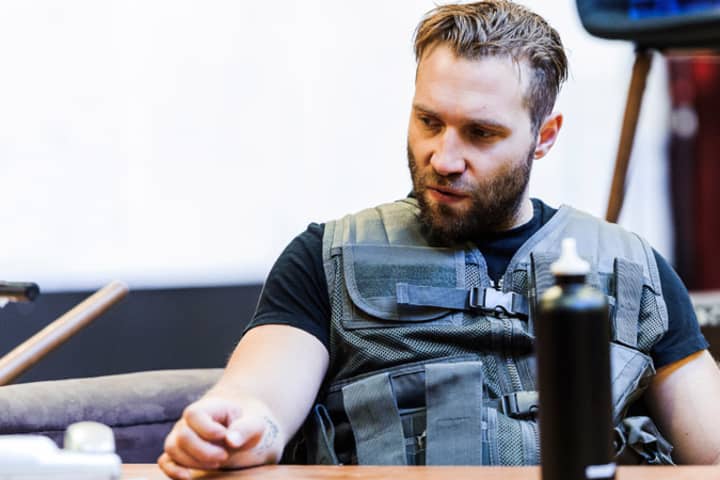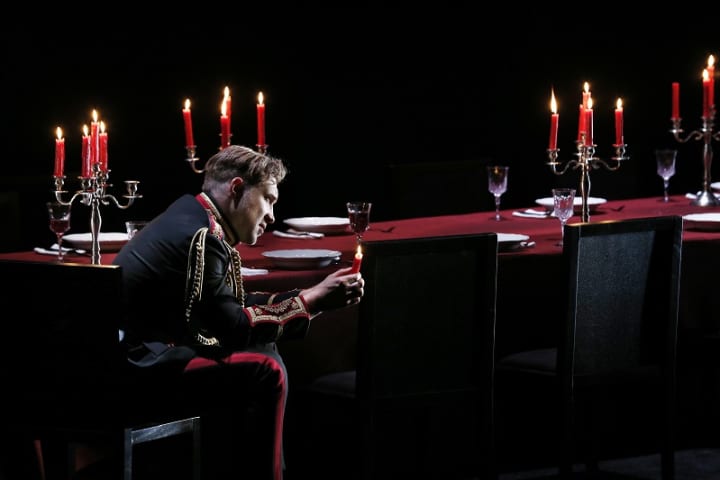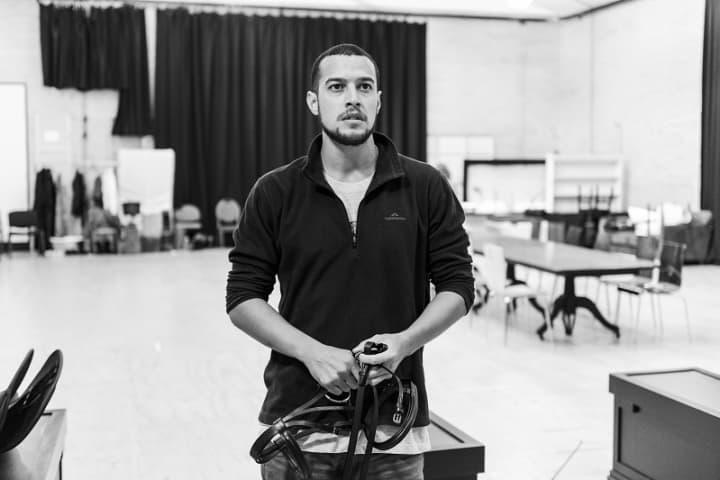Ian McDonald tells us about the sound of Macbeth’s world.
Can you describe the world of this play musically?
The language is very earthy and dark, but it has an urgency because the journey Macbeth is on progresses very quickly. I’m looking for dark, earthy sounds, but also I’m keen to keep a more traditional orchestral quality in the air because although it’s a contemporary setting, I feel that gives it a weight. It gives it a sweep, and also throws it back into something more traditional as well. Shakespeare’s language is somewhat formal, so I’ve opted for that as opposed to more electronic sounds.
Are there particular instruments that you’ve used?
Brass and percussion feature heavily in this composition. Particularly the lower orchestral strings for dark, ominous tides of music. Simon likes to work in a filmic style, so the score works like a film score and there is a fairly constant presence in the background. Once the revolve in the theatre starts moving, you really do need a sound that goes with it. I feel that the bigger, darker orchestral sounds give it a weight and a presence. Then there are more contemporary percussive sounds, particularly for the witches. They have a more distorted sound.
In addition to your original music, what are some of the real-world sounds you’ve used?
As well as the musical sounds, there’s a whole lot of Foley (in film terms that’s naturalistic sounds in the background), e.g. doors, horses, dogs etc. In particular, the weather is talked about a lot in this play: thunder, a sense of distant lightning. The other background to the play is that there’s a war going on. At the beginning, there is a battle, so there are realistic battle sounds, but contemporary: helicopters, explosions, guns – and of course at the end it’s all about a war on a big scale. So that is set in the background, and puts a context for the two fighters. As Macduff and Macbeth fight it out, you have to understand that that’s happening in the context of a larger battle, they’re just the generals. There is a world beyond them, and they represent that whole world. In order to do that, music becomes really important to set them as a kind of emblem of a bigger struggle.
Where do you get these sounds from?
Over the years I’ve built up quite a library, and sometimes I’ll think back to the shows that we’ve done previously to use those naturalistic sounds – for example, Richard III had a strong war presence at the end – but with the music I feel I always need to set that afresh for each new show. I can’t draw on music I’ve done before, the language is slightly different. But bangs, clangs, thunder and lightning are the same. I have a library of sounds.
Can you describe how music and sound are part of the rehearsal process?
Simon is very active in rehearsals with movement and likes to work out the sound and the beats that will articulate that movement in real time. So I’m working in the room with him and the actors. If they’ve got a scene to work on where there’s no specific music, I’ll work in the background on headphones, but when I’m required to have music in the scene then I’ll feed that in and pretty well make it up on the spot. I’ll throw in some beats and some orchestral stuff that I have on file, and we look at how that works. It’s a combination of working immediately, working live, and I see what he’s looking for so I go and prepare another ten seconds of music.
Can you imagine preparing for a show like this without being in the room?
No, you can’t. In the past I’ve done things at home in my own studio after detailed briefings with the director. Sometimes it can work, but often it doesn’t fit, so I have to go away and redo it and hope I’ve got it right. Whereas if I’m in the room, I just sort it out on the spot. Even if it’s rough, even if the timings are not quite right, I get the timing, the volume, the dynamic, and then I can go into my headphones and quietly detail it, change those strings, changing the cellos, the brass sounds etc. It’s much more efficient, and it’s good for the actors to hear the timings and the beats, especially when it’s so integrated – they often work off the beats. The lights will also know what they’re working toward when we get into the theatre, rather than all the music arrive when we’re in the theatre and it’s a big surprise for everyone. It can take a long time to adjust. In this show there’s a lot of big sound, so it can be very intrusive if it’s not in the right place.
What advice do you have for aspiring sound designers or composers?
Listen. Listen to lots of stuff. In preparation for this show I listened to a lot of big orchestral music from classical composers, particularly Shostakovich and some twentieth century orchestral composers, but I also listened to some more contemporary percussive music, and that just gave me a sense of the language. Someone should listen widely, think about the sort of stuff they’d like to research, then spend hours and hours listening. Know your territory, so that when you come in to work live, you’re not trying to think, ’I wonder what that would be?’ Now I can think ‘there’s a piece of Shostakovich that does just that‘, so I cannot copy it, but try and create a similar sort of feel.
You’ve been involved in Simon’s two previous Shakespeare’s (Richard III and Hamlet) for MTC, now you’re completing the trilogy. Is a show like Macbeth the ultimate Shakespeare?
This is a very exciting production. Macbeth is a very exciting script, the way it’s written, the story it’s telling and the layers it works on; the supernatural, the war, the power – it’s all mixed. You get all different varieties of that in other Shakespeares, for sure – but this one is a drama and I enjoy those. But you just respond to the story and deal with it. I’ve done a lot of Shakespeare with Simon and they’re all different. They all ask for different things.
Macbeth plays at Southbank Theatre from 5 June. Book now.
Published on 15 June 2017





